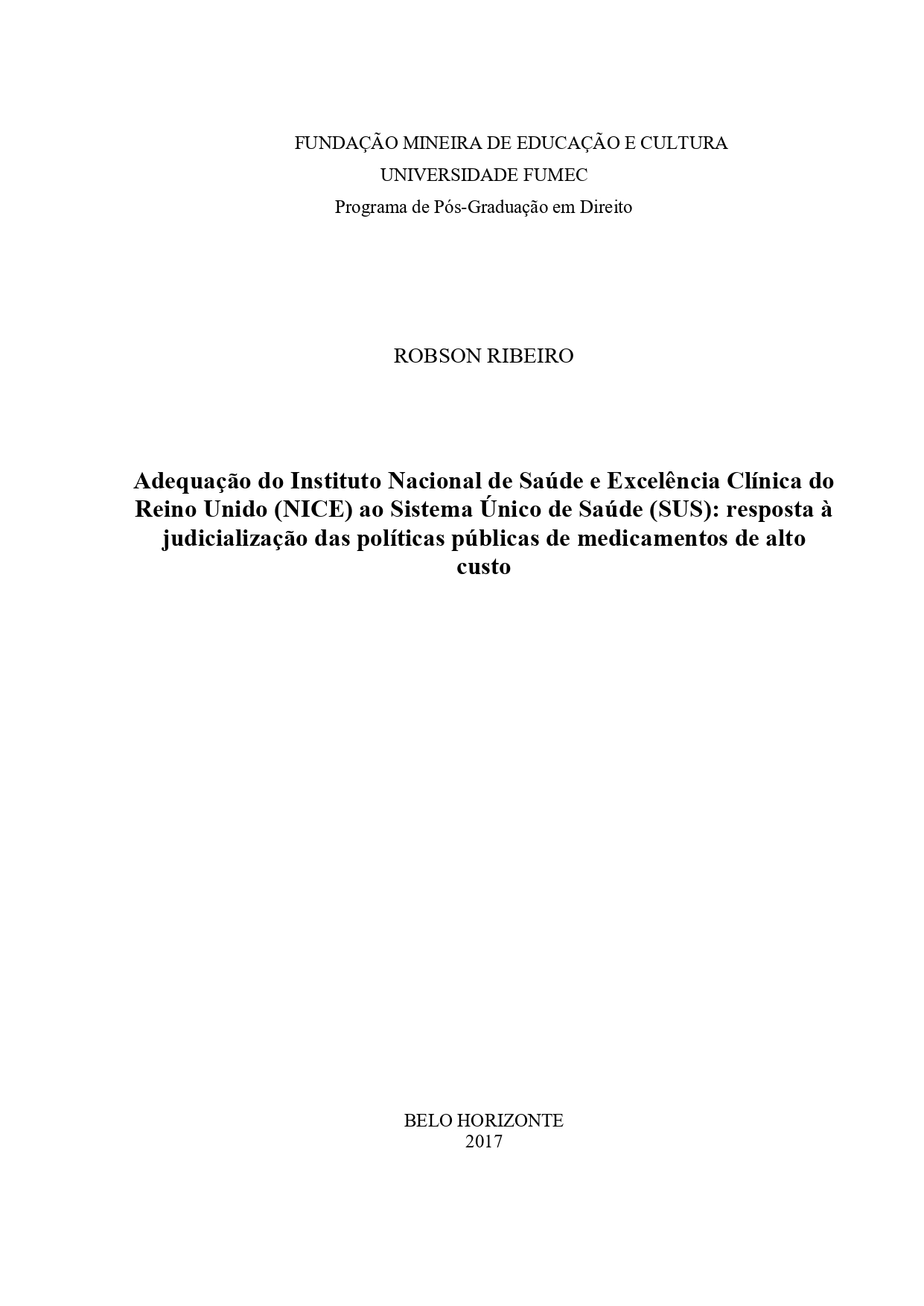Adequação do Instituto Nacional de Saúde e Excelência Clínica do Reino Unido (NICE) ao Sistema Único de Saúde (SUS): resposta à judicialização das políticas públicas de medicamentos de alto custo

Visualizar/
Data
2017Autor
Ribeiro, Robson
xmlui.mirage2.itemSummaryView.MetaData
Mostrar registro completoResumo
A Constituição Federal de 1988 fornece a chave das relações existentes entre homem e o
direito à saúde e prova que um reage sobremaneira ao outro. A previsão constitucional garante
a saúde como “direito de todos e dever do Estado”, porém sua aplicação prática vem sendo
mitigada por questões orçamentárias e desídia do Poder Público. A partir disso, o Judiciário é
chamado para atuar como protagonista nesse campo tormentoso, o que acarreta a
materialização de um direito fundamental social e, reitera a necessidade do Estado de buscar
soluções legítimas que assegurem a saúde digna dos cidadãos, à luz do Princípio da
Dignidade da Pessoa Humana e do Mínimo Existencial. A presente pesquisa sugere a
possibilidade de adequação do National Institute for Health and Clinical Excellence – NICE –
ao sistema de saúde brasileiro, no que refere o medicamento de alto custo. O tradicional
modelo de gestão vigente é insuficiente para tratar das complexidades do fornecimento de
remédios e tratamentos excepcionais, assim, a necessidade de inovação e eficácia de um
Instituto alternativo exsurge como resolução exitosa, pois poderia constituir-se como um
importante vetor de redução da judicialização. O Reino Unido alcançou níveis significativos
para a saúde dos ingleses ao longo dos anos, tornando-se um exemplo para outros países.
Deste modo, a criação do NICE mostrou-se como uma das verdadeiras causas para esse
alcance, através de estratégias inteligentes e da relação custo-benefício – com orientações e
recomendações – na senda de medicamentos de alto custo. Neste contexto, o trabalho aborda
o nexo entre a participação popular e a representatividade no processo de estruturação de
políticas públicas de saúde, tendo como aporte teórico John Rawls e sua obra Teoria da
Justiça. Explicita sobre ampliação da participação social no Sistema Único de Saúde
consubstanciando o ideal de democracia participativa. Retrata o direito à saúde, consagrado
nos artigos 196 a 200 da Constituição Cidadã e, convergem os vários princípios e diretrizes
consubstanciados na Lei nº 8.080/90 e Lei nº 8.142/90 com os princípios previstos no sistema
inglês. Aborda de forma panorâmica a instituição, o estatuto e o funcionamento do modelo
regulatório inglês em seus aspectos positivos e negativos. Por fim, a pesquisa enxerga em boa
perspectiva uma convergência entre o Instituto e o Sistema Único de Saúde, a fim de
possibilitar o efetivo direito à saúde. The Federal Constitution of 1988 provides the key to the relationship between man and the
right to health and proves that one responds greatly to the other. The constitutional provision
guarantees health as "the right of everyone and the duty of the State", but its practical
application has been mitigated by budgetary issues and the lack of public authority. From this,
the Judiciary is called to act as protagonist in this stormy field, which entails the
materialization of a fundamental social right, and reiterates the State's need to seek legitimate
solutions that ensure the dignified health of citizens, in the light of the Principle of Dignity of
the Human Person and the Minimum Existence. The present research suggests the possibility
of adequacy of the National Institute for Health and Clinical Excellence - NICE -To the
Brazilian health system, regarding the high-cost drug. The traditional management model in
place is insufficient to deal with the complexities of providing medicines and exceptional
treatments, thus, the need for innovation and effectiveness of an alternative Institute exsurges
as a successful resolution, since it could constitute an important vector of reduction of the
judicialization. The UK has reached significant levels for the health of the English over the
years, becoming an example for other countries. In this way, the creation of the NICE has
proven to be one of the real causes for this reach, through intelligent strategies and costbenefit - with guidelines and recommendations - in the path of high cost drugs. In this context,
the paper approaches the nexus between popular participation and representativeness in the
structuring of public health policies, with the theoretical contribution of John Rawls and his
work Theory of Justice. It explains about the expansion of social participation in the Unified
Health System, substantiating the ideal of participatory democracy. It portrays the right to
health, enshrined in Articles 196 to 200 of the Citizen Charter, and converge the various
principles and guidelines embodied in Law 8.080 / 90 and Law 8.142 / 90 with the principles
set forth in the English system. It covers in a panoramic way the institution, the status and the
functioning of the English regulatory model in its positive and negative aspects. Finally, the
research sees in a good perspective a convergence between the Institute and the Unified
Health System, in order to make possible the effective right to health.
